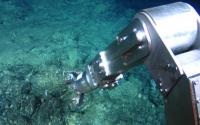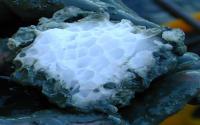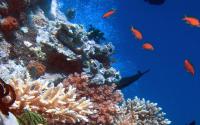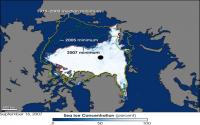News: By Source

Deep-sea mining is floundering. The leading company in the race to mine the ocean floor has fallen out with its host government, while other projects have been delayed until the environmental effects are better understood.
[ More ]
A stormier Arctic could fast-track the greenhouse gas into the atmosphere, potentially accelerating global warming.
[ More ]
Leading marine biologists have joined a call to partly privatise the oceans' beleaguered biology, in the interests of effective conservation. The kill-or-cure message comes from a "blue-ribbon panel" set up by the World Bank's Global Partnership for Oceans, which aims to come up with effective ways of financing ocean protection.
[ More ]
Arctic ice is losing its reflective sheen. It's common knowledge that each summer, more and more of the ice melts leaving the dark waters of the ocean uncovered – a process that accelerates global warming by reducing the amount of solar radiation reflected back into space. Now it turns out that the surviving sea ice is also becoming darker and less reflective.
[ More ]
Billions of tonnes of the greenhouse gas methane are trapped just below the surface of the East Siberian Arctic shelf. Melting means the area is poised to deliver a giant gaseous belch at any moment - one that could bring global warming forward 35 years and cost the equivalent of almost a year's global GDP.
[ More ]
As lucrative oil reserves, rare mineral deposits and shipping lanes emerge amid the rapidly disappearing Arctic ice sheet, the eyes of many nations are turning north. This week, the eight member states of the Arctic Council decided at their meeting in Kiruna, Sweden, to admit six non-Arctic nations as observers, most notably China. New Scientist examines the implications
[ More ]
Japan keeps finding treasure in deep-sea mud. For the second time in two years, a Japanese team has announced vast deposits of rare earth elements on the floor of the Pacific Ocean.
[ More ]
Mining's next frontier is proving tricky to navigate. Last week a British company became the latest firm to announce its intention to mine the seabed. However, it is still unclear how deep-sea mining will affect the oceans.
[ More ]
Expect more water to lap at your shores. That's the take-home message from two studies out this week that look at the latest data on sea level rise due to climate change. The first shows that current projections for the end of the century may seriously underestimate the rise in global sea levels. The other, on the ice sheets of Greenland and Antarctica, looks at just how much of the water stored up there has been moving into the oceans.
[ More ]
We may be closer to a major climate tipping point than we knew. Earth's permafrost – frozen soil that covers nearly a quarter of the northern hemisphere and traps vast amounts of carbon – may be melting faster than thought and releasing more potent greenhouse gasses.
[ More ]